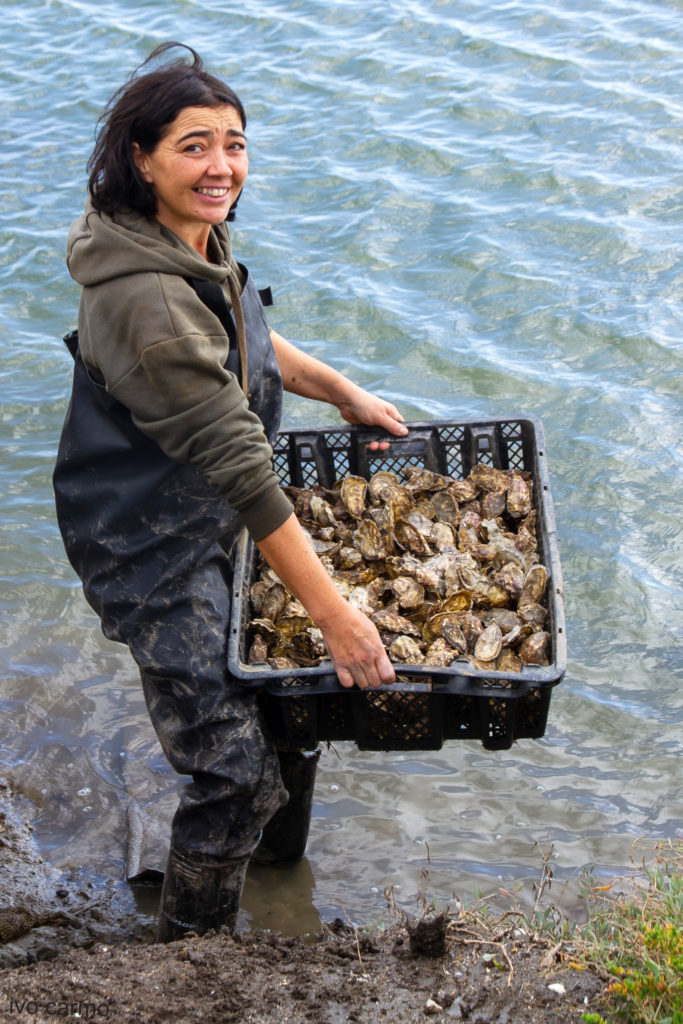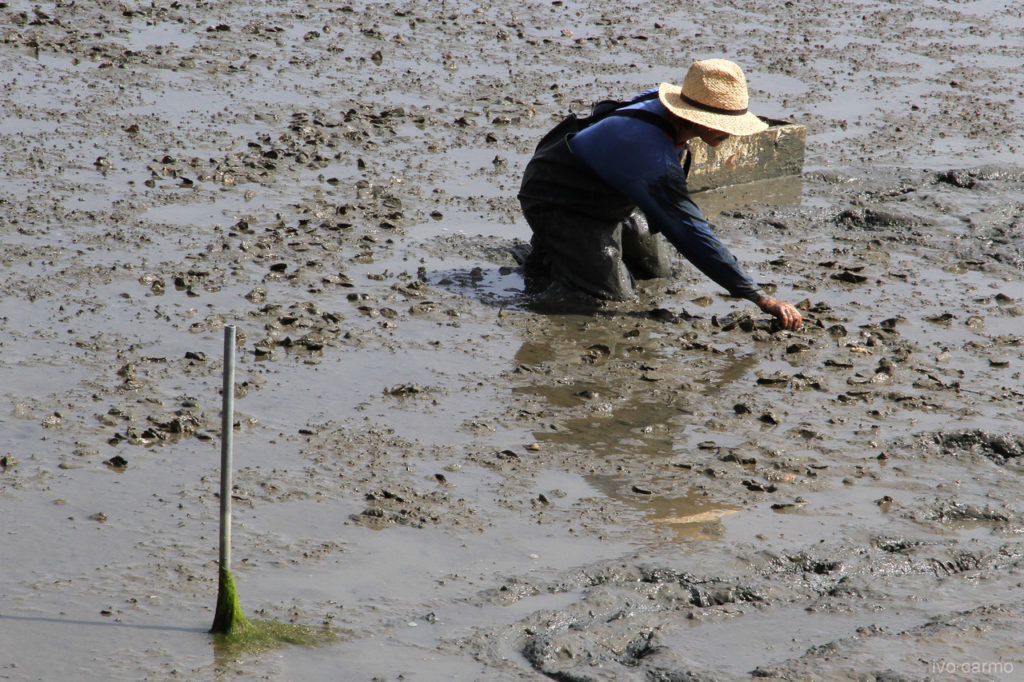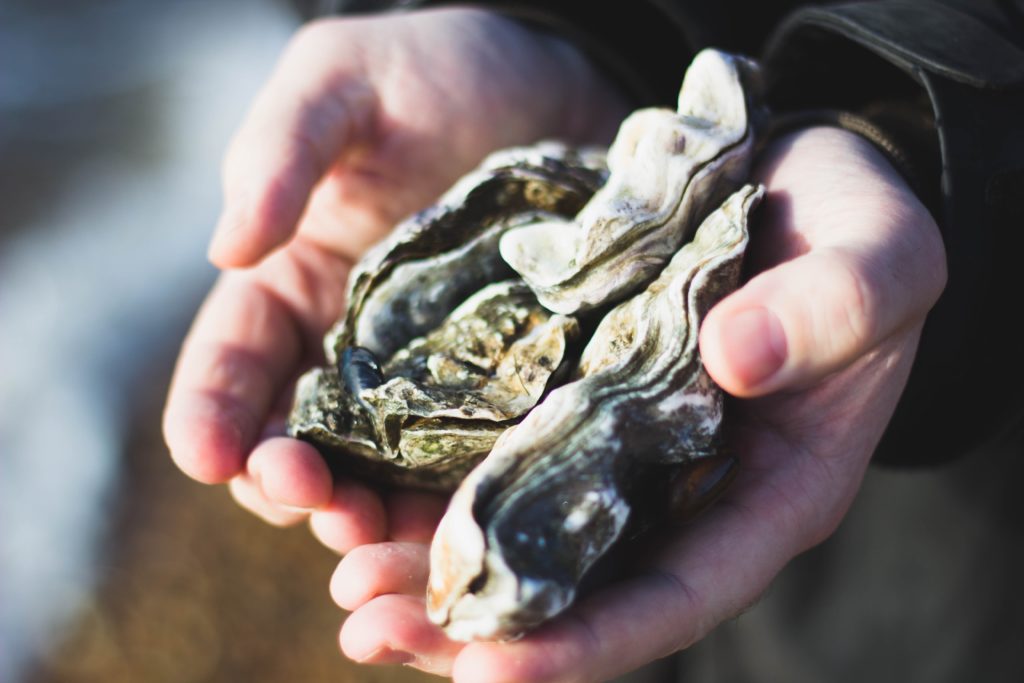Célia Rodrigues is the owner and founder of an award-winning oyster producing business specialising in native Portuguese oysters raised in nurseries on the banks of the Sado Estuary in Setúbal, south of Lisbon. Today her company supplies top restaurants and food markets across the country with oysters, shrimp and indigenous seagrasses all produced using the sustainable practices that give her prodcts their high-quality reputation.
Célia’s story is one that demonstrates the significant, climate-friendly contribution of female entrepreneurs in a sector that is largely governed by men. Women in marine communities, says Célia, should have a stronger voice in the discussions around the long-term environmental and social impacts of their work, a view echoed by environment campaign group Worldwide Wildlife Fund (WWF). “In seafood production and fisheries, women are rarely represented at company level, regional level, European Union level or global level. This needs to change now if we are to tackle the serious problem of the poor health of our oceans which play a vital role in regulating our climate,” says Dr. Anne-Cécile Dragon, marine and fisheries policy officer at WWF’s European policy office.

How women have adapted to a changing fishing industry
Born into a fishing family, Célia worked in a company raising sea bream, sea bass and oysters on the Portuguese coast. In her twenties she started becoming concerned for the environmentally destructive practices she was witnessing around her. The coastline was becoming increasingly industrialised with new harbours and more and more pollutants, like toxins from shipyard paints, seeping into the waters. Meanwhile, the fish stocks she was working with were being fed unsustainably on a high-protein, fish meal diet – a practice she disagreed with.
But it was the local oyster population that particularly concerned Célia. Back in the 1970s a vicious disease known as gill disease almost totally wiped out native Portuguese oysters. Oyster fishers tried to reintroduce the prized shellfish using a Japanese variety although it was a largely unsuccessful experiment as a hybrid oyster variety, incapable of reproducing, emerged. Meanwhile, the remaining oysters starting to grow thick top shells, indicating the presence of heavy metals in the environment.
Then, in the early 2000s, Célia and her local fishermen and fisherwomen friends, discovered a small, but healthy Portuguese oyster population in the Mira river in the south of the country. Using old salt pans, she established a native oyster nursery and local seagrasses farm in her home river estuary in Setúbal, and her now award-winning business – called Neptunpearl – was born.
“We have recovered the biological and gastronomic heritage of our region by reintroducing the production of the Crassostrea Angulata Portuguese oyster,” says Célia. Her farm uses non-intensive methods – including giving oysters up to five times more space than average oyster nurseries and feeding them only natural and locally-found food. Her team also constantly analyses water quality and builds up knowledge on the best ways to care for the oysters and their environment – knowledge which she passes on to other shellfish businesses as part of the consultancy arm of Neptunpearl.
“We are constantly developing and participating in projects, in partnership with various academic and business entities, aimed at knowledge, protection and appreciation of the symbiosis between nature and production in the Sado Estuary,” she says.

Why fishing needs more female voices
Boosting the position of women in the global fishing industry could be one way to enhance the sustainability of a sector which is vital to assuring ocean health. Today, more than two-thirds of the planet’s fish stocks are fished beyond sustainable levels and many destructive fishing practices like scrapping the seabed with bottom-trawling nets and wasting by-catch fish that are too small or the wrong species, are still common. In leading the way with her sustainable, successful oyster business, Célia Rodrigues’s story is just one example of the huge potential for women to take on dual roles as both fruitful seafood producers and sustainable environmental managers.
This focus on sustainability in fishing is important for the climate, because according to a report recently published by climate campaign group Greenpeace, over-fishing is among the factors that have a strong influence on ocean health alongside deep-sea mining, the destruction of coastal habitats and marine plastic pollution. As the world’s biggest absorber of carbon dioxide – also referred to as a carbon sink – oceans have a key role in helping us to manage climate change, but they have to be healthy to do so, says the ‘In Hot Water’ report. “Climate change and loss of ocean biodiversity cannot be tackled separately because of the interlinkage of natural ecosystems and the climate,” it says.
Today, out of the 100 largest seafood companies in the world, only one is run by a female CEO. At the same time, up to 90% of the seafood processing workforce is made up of women performing tasks including preparing fish, taking fish to market, fixing nets and cleaning boats. “The number of women holding managerial posts in the marine sector with decision-making powers remains low and, if increased, may achieve significant socio-economic and environmental sustainability improvements,” says a WWF report.
Climate-first women like Célia, whether they work in fishing or in any other sector, can inspire everyone to push for working practices that put planet before profits. Célia and a group of local men and women have recently added a new environmental concern to their work: campaigning against another new port, called Blue Atlantic, planned to be constructed in their area. The port, they say, is both unnecessary as there is already a deep-water port nearby and will be detrimental to local wildlife and coastal ecosystems.
